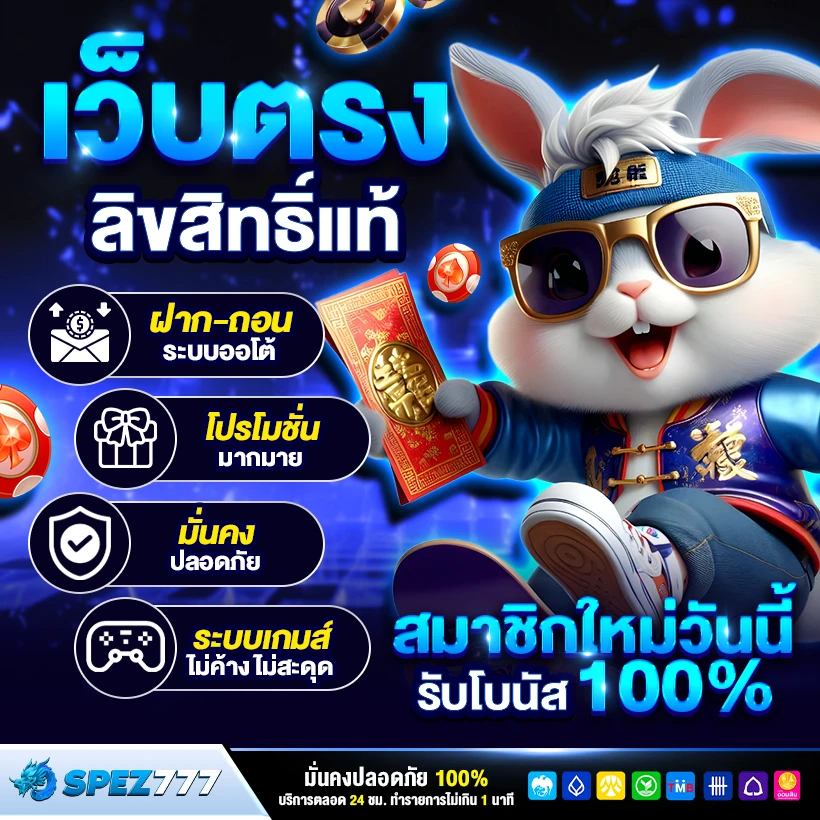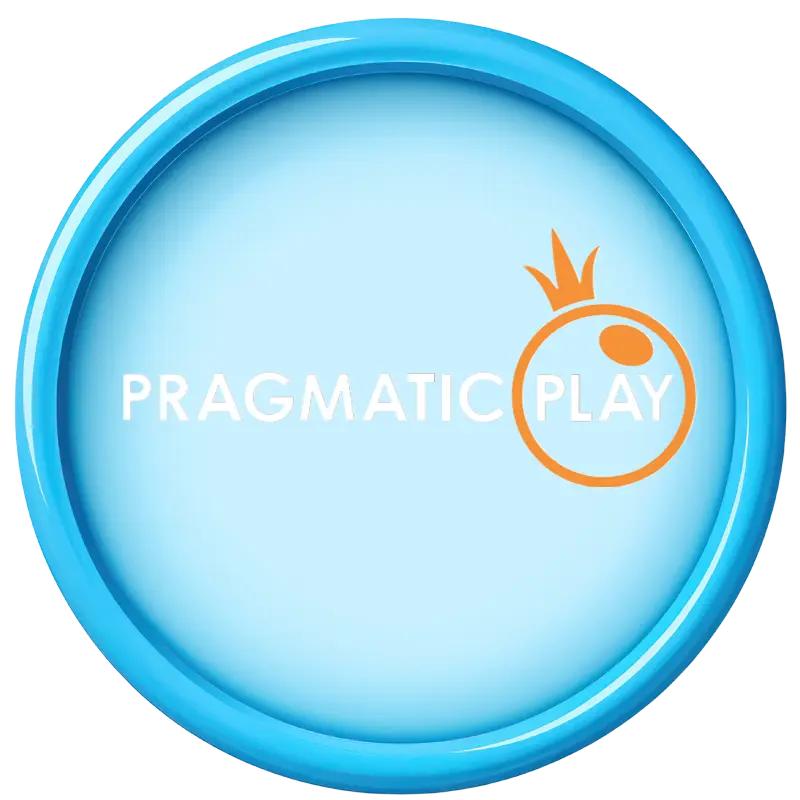


สารบัญ
Toggleสล็อตเว็บตรง มาพร้อมกับความปลอดภัย 100% และการฝาก-ถอน เว็บสล็อต ที่รวดเร็วด้วย True Wallet สะดวกสบายสุด ๆ สล็อต777 ไม่ผ่านเอเย่นต์ แถมยังมีเกม สล็อตออนไลน์ ใหม่ล่าสุด แตกง่าย ให้เลือกเล่นมากมาย ทำให้คุณสามารถทำกำไรบน เว็บสล็อต ได้จริงทุกวัน หากคุณกำลังมองหาเว็บ อันดับ 1 เล่นสล็อต ที่ดีที่สุด เล่นง่ายได้เงินจริง เว็บนี้คือคำตอบ
เว็บสล็อต ที่เล่นง่ายได้เงินจริง และมีเกมสล็อตออนไลน์แตกบ่อยที่สุด เพราะที่นี่เป็น เว็บตรง จากต่างประเทศที่ตอบโจทย์ทุกความต้องการ มีเกมที่ดีที่สุดให้เลือกเล่นเยอะ แถม สล็อตแตกง่าย แบบไม่ต้องรอนาน มาลองเข้ามาเล่นกันเลย รับรองว่าได้กำไรกลับไปแน่นอน
มาเล่นเกม สล็อตเว็บตรง ที่คุณสามารถฝากถอนได้ง่าย ๆ ผ่านทรูวอเลท ไม่มีขั้นต่ำ ฝาก 1 บาท ก็ทำได้ หรือถ้าอยากฝากมากก็ทำได้ตามใจ เกมสล็อตเว็บตรง แตกหนัก แตกจริง รับรองว่าเล่นสล็อตออนไลน์แล้วได้กำไรแน่นอน เว็บตรง 100% ใหม่ล่าสุด ทันสมัยที่สุด ระบบฝากถอน เว็บสล็อตตรง รวดเร็ว ปลอดภัย เล่นง่ายไม่ยุ่งยาก และที่สำคัญได้เงินจริงทุกเกม สล็อตเว็บตรงฝากถอน true wallet ไม่มีขั้นต่ำ ไม่ผ่านเอเย่นต์ ได้เงินจริง เข้ามาสนุกกับการเล่นเกมสล็อตออนไลน์ที่ดีที่สุด ที่จะทำให้คุณได้ทั้งความสนุกและเงินรางวัล สล็อตฝากถอนไม่มีขั้นต่ำ กลับบ้านแบบเต็ม ๆ
สล็อตเว็บตรง คือ เว็บอันดับ 1 เรื่องเกมพนันออนไลน์ เพราะ สล็อตเว็บตรง เป็นเว็บคาสิโนที่ไม่ผ่านเอเย่นต์ ซึ่งช่วยให้ผู้เล่นมั่นใจได้ว่าเล่น สล็อต777 รับวอเลท แล้วจะได้รับเงินจริง ไม่มีการหักเปอร์เซ็นต์จากคนกลาง แถมยังโปร่งใส ปลอดภัย สล็อตเว็บตรง100% อีกด้วย ระบบฝากถอนก็ง่ายมาก ไม่ว่าจะฝาก สล็อต เว็บตรง ฝากถอน ไม่มี ขั้น ต่ำ true wallet ก็สะดวกสุด ๆ อีกทั้งยังรองรับการเล่นสล็อตผ่านมือถือ และคอมพิวเตอร์ จึงทำให้เป็นที่นิยมอย่างรวดเร็วในหมู่ผู้เล่นทุกคน หากคุณกำลังมองหาเว็บที่น่าเชื่อถือ และให้บริการดี เว็บสล็อตเว็บตรง คือตัวเลือกที่ดีที่สุดตอนนี้
มาเช็ค 3 เหตุผลทำไมต้องเล่น สล็อตเว็บตรง 100 % ไม่ผ่านเอเย่นต์ โดย เว็บตรง 100% จะมีความโปร่งใส ปลอดภัยที่สุด ไม่มีการหักค่าคอมมิชชั่นจากคนกลาง แน่นอนว่าคุณจะได้เล่นเกมสล็อตลิขสิทธิ์แท้ แตกง่าย และได้เงินจริง สล็อตเว็บตรง จะมีระบบที่ทันสมัย ฝากถอนรวดเร็ว ไม่ต้องรอนาน และ เว็บสล็อต pg เว็บตรง คือตัวเลือกที่ดีที่สุด หากคุณไม่อยากพลาดโอกาสทำกำไร จาก slot ที่แตกบ่อยต้องเลือก เว็บตรงสล็อต ไม่ผ่านเอเย่นต์ เท่านั้น ซึ่งมีเหตุผลเพิ่มเติมอีกดังนี้
ถ้าคุณกำลังมองหา สล็อตเว็บตรง ที่ปลอดภัยและน่าเชื่อถือ มาเจอกับเว็บที่ใช้ระบบที่มั่นคง ไม่ต้องกังวลเรื่องความปลอดภัย เลย เพราะที่นี่คือ เว็บตรง ใช้ สล็อตทรูวอเลท ฝากถอนง่าย ไม่ผ่านคนกลาง ให้คุณเล่นได้อย่างสบายใจ สนุกได้เต็มที่กับการเล่น slot ออนไลน์ได้เงินจริง แบบไม่มีปัญหากวนใจ
ถ้าคุณกำลังมองหาเกมสล๊อตที่มีอัตราการจ่ายคุ้มค่าที่สุด ลองเล่นกับ เว็บตรง ที่มีค่ายเกมสล็อต ลิขสิทธิ์แท้ ไม่ต้องห่วงเรื่องการโกง เพราะทุกเกมมีความโปร่งใสและจ่ายจริง ยิ่งเล่นยิ่งมีโอกาสทำกำไรสูง เกมแตกง่าย แจ็คพอตกระจาย รับรองว่าคุ้มค่าความสนุกและกำไร
โปรโมชั่นสุดคุ้มที่แจกจริง ถอนได้ไม่อั้น ถ้าคุณเป็นสมาชิกใหม่รับโบนัสสล็อตไปเลยเต็ม ๆ มาลองเล่น เกมสล็อตเว็บตรง แตกบ่อย สล็อตพีจีที่มีเกมสนุก ๆ และรางวัลใหญ่ เกมสล็อต รอคุณอยู่ ทุกการหมุนมีโอกาสทำกำไรสูง ลุ้นได้ทุกครั้งที่เล่น สล็อตเว็บตรง โปรโมชั่น นี้คุ้มค่ามากจริง ๆ
เว็บสล็อตตรง ฝาก-ถอนเร็วสุด ๆ แค่ 10 วินาที ไม่มีบัญชีธนาคารก็เล่นได้ เพราะเราเปิดรองรับ สล็อตเว็บตรงฝากถอน true wallet ไม่มีขั้นต่ำ ไม่ว่าจะฝาก 1 บาท หรือจำนวนเยอะก็ทำได้ง่าย ๆ แถมเกมสล็อตเว็บนี้ก็แตกบ่อย สนุกไม่มีเบื่อ มาสนุกกันเลย
เว็บสล็อต ใหม่ล่าสุด มาแรงที่สุดตอนนี้ ระบบฝาก-ถอนออโต้ทั้งหมดไม่มีขั้นต่ำ ไม่ผ่านเอเย่นต์ เล่นง่าย สะดวก และปลอดภัย 100% ที่นี่คุณสามารถสนุกกับ เกมสล็อตออนไลน์ มาใหม่จากค่ายนอก ไม่ว่าจะเป็น สล็อตแจ็คพอต ที่แตกบ่อย หรือเกม สล็อตค่ายนอก ใหม่มาทุกเดือน เว็บสล็อต ของเรารวบรวมเกมจากทุกค่ายดังจากสล็อตต่างประเทศ เอาไว้ให้คุณได้เลือกเล่น สล็อตออนไลน์อย่างจุใจ รวมไปถึงสล็อตมาใหม่ไม่ต้องห่วงเรื่องการโกง เราเป็นเว็บที่ดีที่สุด และได้รับความไว้วางใจจากผู้เล่นมากที่สุด ถ้าอยากเล่นเกม เว็บสล็อต อันดับ 1 ที่คุ้มค่าและจ่ายจริงแบบไม่มีปัญหาหรือข้อกังวล เลือก สล็อตเว็บตรง เว็บนี้เลย รับรองว่าคุณจะได้ทั้งความสนุกและกำไรกลับบ้าน
ไม่สะดุดทุกการหมุน เว็บสล็อตวอเลท ระบบ API ใหม่ล่าสุด ความเสถียรสูง ที่เราใช้ในเว็บทำให้การเล่นเกมลื่นไหล ไม่มีปัญหา ไม่มีสะดุดแม้แต่นิดเดียว มั่นใจได้เลยว่าเกมที่ค่ายเกมสล็อตของเรานำเสนอนั้นมีคุณภาพสูง ทุกเกมสล๊อตสนุกและทำกำไรได้จริง ๆ ไม่ว่าจะเป็นเกม สล็อตออนไลน์ ที่มีแจ็คพอตใหญ่หรือเกมอื่น ๆ ที่ให้ผลตอบแทนคุ้มค่ากับการลงทุน ระบบ เว็บสล็อตทรูวอเลท ของเรายังปลอดภัย รวดเร็วที่สุด ฝาก-ถอนง่าย ไม่มีขั้นต่ำ สล็อตเว็บตรง ไม่ต้องผ่านเอเย่นต์ รับรองว่าไม่ว่าจะเล่นเกมไหนก็ได้กำไรได้เงินจริง แถมเล่นง่ายผ่านวอเลท สล็อตเว็บตรง สะดวกสุด ๆ อย่าพลาดกับ เว็บตรงสล็อต ที่ดีที่สุดที่ไม่ทำให้คุณผิดหวัง

สล็อตเว็บตรงฝาก ถอน true wallet ไม่มีขั้นต่ํา เว็บสล็อต ที่เล่นได้ทุกที่ทุกเวลา ปลอดภัย ไร้กังวล เพราะเว็บพนันเว็บนี้ได้รับการรับรองถูกกฎหมาย มีใบอนุญาต ที่เชื่อถือได้จริง ทุกการฝากถอน สล็อตทรูวอเลท เป็นไปอย่างรวดเร็วและสะดวกสุด ๆ ไม่ต้องผ่านคนกลาง เล่นแล้วได้เงินจริง ไม่มีขั้นต่ำ การันตีไม่มีโกง ที่สำคัญคือ สล็อตเว็บตรงแตกง่าย ฝากถอน ไม่มีขั้นต่ำ พร้อมให้บริการทุกท่าน ที่ต้องการเล่นเกมพนันออนไลน์กับเว็บที่ปลอดภัยและมั่นคงที่สุด มาเล่นแล้วทำกำไรไปกับเราได้เลย
มาเลย! นี่คือ 6 เว็บสล็อต ที่ดีที่สุดในตอนนี้ สล็อตเว็บตรง แท้ 100% อันดับ 1 ระบบทันสมัย ฝากถอนง่าย ไม่มีขั้นต่ำ และที่สำคัญปลอดภัยแน่นอน ไม่ผ่านเอเย่นต์ เล่นเกมจากค่ายดังอย่าง สล็อต PG รับรองว่าแตกง่าย ทำกำไรได้จริง เว็บสล็อตวอเลท ของเรามีระบบที่โปร่งใส เชื่อถือได้ 100% ฝากถอนผ่านวอเลทก็สะดวกสุด ๆ แถมยังมีโปรโมชั่นเด็ด ๆ รอคุณอยู่ มาเล่น เกมสล็อตเว็บตรง ที่ดีที่สุดและทำเงินได้เต็มที่กับ เว็บตรง ที่ปลอดภัยไม่มีขั้นต่ำ รับรองคุณจะไม่ผิดหวัง แนะนำเว็บเกมแตกง่าย ดังต่อไปนี้

Dragon444 เว็บตรง ที่ให้โบนัสจัดเต็ม อยากทดลองเล่นสล็อต ก่อนลงเงินจริง ที่นี่มีโหมดทดลองเล่นสล็อตให้คุณได้ลองเล่นแบบไม่ต้องเสี่ยง ฝาก-ถอนง่ายและปลอดภัยสุด ๆ น่าเชื่อถือ เกมสล็อตที่รับรองว่าเล่นแล้ว ไม่มีปัญหาหรือการโกงแน่นอน มาลอง สมัครก่อนแล้วมาเล่นเกมสนุก ๆ กับเรากัน

Punslot168 คือ สล็อตเว็บตรง ที่ให้บริการ สล็อต แตกง่าย และมีโปรโมชั่นสุดคุ้ม เล่นแล้วมั่นใจได้เลย เพราะเว็บนี้ปลอดภัย เว็บตรง 100 % ไม่ผ่านเอเย่นต์ น่าเชื่อถือ การันตีความสนุกและกำไร เล่นได้ทุกวันไม่มีเบื่อ

เว็บสล็อตตรง ไม่ผ่านเอเย่นต์ ปลอดภัย และน่าเชื่อถือ 100% คุณสามารถเล่นเกม สล็อต PG ได้อย่างสบายใจ โดยไม่ต้องทำเทิร์นให้ยุ่งยาก ระบบรวดเร็วและสะดวก ฝากถอนง่าย เล่นแล้วได้เงินจริงแน่นอน เว็บสล็อตตรง เว็บนี้การันตีความสนุกและรางวัลใหญ่มากมาย ถ้าคุณไม่อยากพลาดโอกาสดี ๆ ลองเข้ามาเล่นกัน

เว็บสล็อต อันดับ 1 ที่ให้บริการ เกมสล็อต เว็บตรง ฝากถอนง่าย ไม่มีขั้นต่ำ คุณสามารถสนุกกับ สล็อตคุณภาพสูง จากค่ายชั้นนำ ฟีเจอร์ครบครัน และมีโปรโมชั่นดี ๆ รอคุณอยู่ พร้อมให้คุณเล่น สล็อตเว็บตรง ได้อย่างลื่นไหลและได้เงินจริง

เว็บสล็อตตรง ระบบทันสมัย ที่รองรับ สล็อต PG แตกง่าย มีโปรโมชั่นสำหรับสมาชิกใหม่ แถม เว็บตรง สล็อต ฝากถอน ไม่มี ขั้นต่ำ 1 บาท ก็ ถอนได้ ทันที ไม่ว่าจะฝากผ่านธนาคารหรือวอเลทก็สะดวกสุด ๆ มาเล่นเกม เว็บสล็อต วอ เลท สนุก ๆ กับเว็บที่มั่นคงและปลอดภัย

เว็บสล็อต ใหม่ล่าสุดที่คุณไม่ควรพลาด รวมสล็อตจากค่ายชั้นนำ และรองรับ สล็อตทรูวอเลท ฝากถอนได้ไม่มีขั้นต่ำ เริ่มเล่นได้เพียง 1 บาท เท่านั้น และยังมีโอกาสลุ้นแจ็คพอตใหญ่ ร่วมสนุกกับเกมสล็อตคุณภาพสูง ที่เล่นง่ายและจ่ายจริง
สมัครเว็บสล็อตไม่ผ่านเอเย่นต์ แล้วรับข้อเสนอสุดพิเศษเพียบ เว็บสล็อตดี ๆ คุ้มค่าทุกการลงทุนอย่างแท้จริง ด้วยระบบออโต้ ที่ทันสมัยและใช้งานง่าย สมัครสล็อตเว็บตรง เพียงไม่กี่ขั้นตอนก็เริ่มเล่นได้ทันที แถมยังมีโบนัสสล็อตแจกไม่อั้น ทุกการเล่นเต็มไปด้วยความสนุก ทดลองเล่นสล็อตฟรี ๆ ก่อนไปลงเดิมพันจริง และร่วมสนุกกับเกมสล๊อตจาก เว็บสล็อตออนไลน์ ระดับโลก ที่จ่ายเงินจริง พร้อมระบบฝาก-ถอนที่รวดเร็วและปลอดภัย สามารถ สมัครเว็บสล๊อตทรูวอเลทได้ง่าย ๆ รับประกันว่าเล่นสล็อต ได้อย่างสบายใจ ไม่ต้องผ่านเอเย่นต์ มาร่วมสนุกกับเรา เว็บสล็อตออนไลน์ ได้เงินจริง แล้วทำกำไรไปพร้อมกัน

โปรโมชั่น สมาชิกใหม่ สล็อตเว็บตรง ที่แจกหนัก ถอนเงินได้จริง ใช้เล่นทุกเกมได้ทันทีแบบไม่มีเงื่อนไขยุ่งยาก สมัครเว็บสล็อต กับเราวันนี้รับโบนัสสล็อต 100% ฝาก 100 รับ 100 ทันที เล่น สล็อตแตกหนัก แตกจริง ถอนเงินได้จริงทุกยอด สล็อต PG และเกมสล็อตแมชชีนมากมายรอคุณอยู่ รับประกันความสนุก ได้เงินจริง บน เว็บสล็อต พร้อมทั้งโบนัสสล็อตสุดคุ้ม เล่นได้ทุกเกมที่คุณชอบและถอนเงินสล็อตได้ไม่อั้น ถอนเงินจริงได้ มาร่วมสนุกสล็อตออนไลน์กับเว็บ สล็อตแท้ อันดับ 1 ที่เชื่อถือได้ใน ประเทศไทย แล้วรับรางวัลโบนัสใหญ่ไปกับเรา
รวมให้แล้วกับ 6 เกมสล็อตแตกง่าย บนค่ายเกมสล็อตดีที่สุดของโลก เล่นกับ เว็บสล็อตเว็บตรง ไม่ผ่านเอเย่นต์ ที่ดีที่สุด รับประกันความสนุกและได้เงินจริงทุกเกม มั่นใจได้เลยว่าเกมสล็อตจาก สล็อตเว็บตรง เป็นเกมลิขสิทธิ์แท้ โบนัสจัดเต็ม และ โปรโมชั่นดี ๆ รอคุณอยู่ เล่นง่ายฝาก-ถอนรวดเร็วผ่านทรูวอลเลท ไม่มีขั้นต่ำ 1 บาทก็เล่นได้ เกมสล็อตจากค่ายชั้นนำระดับโลกที่แตกบ่อยที่สุด อยากเล่นเกมไหนก็เลือกได้ตามใจ ช่วงเวลาไหนก็เล่นเกมแตกแน่นอน มาสนุกกับ เว็บสล๊อต ที่เชื่อถือได้ เล่นแล้วถอนเงินได้จริง ดังต่อไปนี้

PG SLOT คือ ค่ายเกมสล็อต บน เว็บสล็อตตรง ที่เต็มไปด้วยสล๊อตสุดมันส์จากค่ายดัง หากคุณชอบ สล็อตแมชชีน ที่แตกหนัก ต้องไม่พลาดที่นี่แน่นอน โบนัสจัดเต็ม เล่นง่ายทุกเกม พร้อมลุ้นรางวัลใหญ่จาก สล็อต pg เว็บตรง แตกหนัก ทุกครั้งที่เล่น อยากลองเสี่ยงโชคกับเกมที่สนุกและได้เงินจริง ต้องที่นี่เลยเว็บพนันไม่ผ่านเอเย่นต์ รับรองว่าคุ้มค่าทุกการลงทุน

SPADEGAMING ค่ายสล็อตมาใหม่ที่มาแรงสุด ๆ มีเกมสล็อตสุดมันส์และโบนัสจัดเต็มรออยู่ อยากรู้วิธีเล่นสล็อตให้ได้กำไร? มาที่นี่เลย เว็บสล็อต ยอดนิยม อันดับ 1 ที่คนเล่นเยอะที่สุด เล่นง่าย สล็อตโบนัส แตกบ่อย รับรางวัลใหญ่ได้ไม่ยาก สนุกกับเกมใหม่ ๆ ที่มีให้เลือกเพียบ เล่นได้ทุกที่ทุกเวลา พร้อมให้คุณลุ้นโชคและทำกำไรอย่างสนุกสน

JOKER GAMING คือค่ายเกมสล็อตออนไลน์ที่ดีที่สุด เต็มไปด้วยเกมสล็อตที่แตกง่าย และสล็อตแจ็คพอตใหญ่ ให้คุณได้ลุ้นกันทุกครั้ง ฟีเจอร์พิเศษและฟรีสปินเพิ่มโอกาสในการชนะให้มากขึ้น ฝาก-ถอนง่าย สะดวกสุด ๆ โบนัสเกมสล็อตจัดเต็ม ไม่มีเบื่อ ลุ้นรางวัลใหญ่อย่างต่อเนื่อง สล็อตฟรีสปินเล่นง่าย ทำเงินได้จริง อยากสนุกกับเกม slot ที่ดีที่สุด ต้องที่นี่เลย

PRAGMATIC PLAY คือค่ายสล็อตออนไลน์ที่คุณไม่ควรพลาด เล่นเกมสนุก ๆ เชื่อถือได้ และมีโบนัสสล็อตจัดเต็มทุกเกม ทุกครั้งที่หมุนคุณจะรู้สึกตื่นเต้นกับโอกาสในการชนะรางวัลใหญ่ ค่ายนี้มีเกมสล็อตที่หลากหลายให้เลือกเล่น มั่นใจได้เลยว่าทุกการเล่นเกมสล็อต ปลอดภัย น่าเชื่อถือ และได้เงินจริง

JILI SLOT คือ ค่ายเกมสล็อตแตกง่าย แตกจริง ถ้าคุณชอบเล่นสล็อตที่สนุก และมีโอกาสทำกำไรสูง ต้องลองทดลองเล่นเกมสล็อต เกมสล็อตเว็บตรง จาก JILI มาพร้อมฟีเจอร์สุดเจ๋ง ที่จะทำให้คุณเพลิดเพลินไปกับการเล่นสล็อต อีกทั้งยังมีโหมดทดลองเล่นให้ลองเล่นสล๊อตฟรีก่อนใคร มั่นใจได้ว่าเล่นแล้วสนุก ทำกำไรได้จริง

CQ9 คือ ค่ายเกมสล็อตออนไลน์ ที่เชื่อถือได้จริง มีเกมสล็อตสนุก ๆ ให้เลือกเล่นเพียบ ทุกเกมมาพร้อมกราฟิกสวยงาม และโบนัสจัดเต็ม ไม่ว่าจะเล่นเพื่อสนุกหรือเพื่อทำกำไร CQ9 พร้อมตอบโจทย์ทุกความต้องการของนักเล่นเกมทุกคน เล่นง่ายได้เงินจริง ลุ้นรางวัลใหญ่ สล็อตเว็บตรง ได้ทุกครั้งที่หมุน
เว็บที่ให้คุณทดลองเล่นเกมแบบไม่ต้องดาวน์โหลด สามารถเล่น สล็อตเว็บตรง ได้ทุกค่ายเกมที่คุณชื่นชอบ ทั้งสล็อตแตกหนัก และเกมที่มีโบนัสจัดเต็ม สำหรับใครที่ยังไม่มั่นใจในการเล่น สล็อตเว็บตรง แนะนำให้ใช้การทดลองเล่นสล็อต ฟรีๆ ช่วยให้คุณคุ้นเคยกับเกมต่าง ๆ ก่อน เล่นสล็อตเว็บตรง จริง ไม่ว่าจะเป็น เกมสล็อตเว็บตรง ที่เล่นง่ายหรือเกมสล็อตที่มีฟีเจอร์พิเศษ คุณสามารถเข้ามาทดลอง เว็บตรงสล็อต ได้เลย ไม่มีค่าใช้จ่ายใด ๆ รับรองว่าจะสนุก และเพลิดเพลินไปกับการหมุน สล็อตทดลองเล่น ทุกครั้ง ลุ้นรางวัลใหญ่ สล็อตเว็บตรงแตกหนัก ได้ตลอดเวลา
เกมสล็อต เดโม่ ที่ ทดลองเล่นสล็อตฟรี ๆ ได้แล้ว ไม่ต้องกังวลเรื่องเงินทุน แค่สมัครเข้ามา และทดลองเล่นเกมสล็อตที่คุณชอบได้ทุกเกม พร้อมรับโปรโมชั่นสล็อตสุดคุ้ม ที่ให้คุณเล่นได้สนุกยิ่งขึ้น สล็อตทรูวอลเลท ฝากถอน true wallet ไม่มีขั้นต่ำ จะฝาก 1 บาท หรือถอนเท่าไรก็ได้ทั้งหมด สล็อตเว็บตรง ระบบออโต้ที่รวดเร็วและปลอดภัยสุด ๆ เพียง สมัครสล็อตเว็บตรง ทำ สล็อตวอลเลท และทดลองเล่นเกมต่าง ๆ ก่อนลงเงินจริง รับประกันความสนุก และโอกาสในการชนะรางวัลใหญ่
ถ้าคุณยังไม่เคยลองเล่น สล็อตเว็บตรง ไม่ผ่านเอเย่นต์ ลองดูสักครั้ง นี่คือ 4 ข้อดีที่คนเลือกเล่นคาสิโนออนไลน์กันเยอะที่สุด ไม่ต้องกังวลเรื่องขั้นต่ำ ไม่ผ่านเอเย่นต์ เพราะเว็บพนันออนไลน์ มักจะไม่มีขั้นต่ำในการฝาก-ถอน แถมยังมีความปลอดภัยสูง ระบบการเงินที่โปร่งใส 100% และโบนัสสุดคุ้มจาก สล็อตแตกง่าย ที่คุณสามารถชนะได้จริง รวมถึงคาสิโนสดและ เกมบาคาร่าให้เลือกเล่น มีเกมสล็อตเยอะมาก ๆ มั่นใจได้ว่าทุกการเดิมพันเกมสล็อตยอดนิยม จะไม่มีการโกงเลย มาเปิดประสบการณ์ สล็อตเว็บตรง ใหม่กัน และข้อดีที่ห้ามพลาดเมื่อเข้ามาเล่นที่นี่ คือ
ถ้าคุณกำลังมองหาค่ายที่ไว้ใจได้และน่าเล่น เว็บตรงสล็อต รวมเกมเด็ดจากค่ายชั้นนำไว้มากมาย ไม่ว่าจะเป็นเกมสล็อตสุดมันส์ หรือสล๊อตทำเงินที่เล่นง่าย แจ็คพอตแตกไว ที่นี่คุณจะได้พบกับสล็อตคุณภาพสูงจากค่ายที่ทุกคนยอมรับ รับรองเล่นสนุกและได้เงินจริงแน่นอน มาเลือกเล่นตามความชอบและลุ้นรางวัลใหญ่ไปพร้อมกัน
ฝากถอนง่ายสุดๆ ด้วยระบบอัตโนมัติ ที่ทำให้ทุกการทำธุรกรรมรวดเร็วทันใจ สล็อต ฝาก ถอน true wallet ไม่มี บัญชีธนาคาร ด้วยการฝากถอน สล็อตเว็บตรง ฝากถอนไม่มีขั้นต่ำ true wallet ที่สะดวกสุด ๆ สำหรับใครที่อยากเล่นเกมออนไลน์ ระบบนี้เหมาะมากเลย ลุ้นแจ็คพอตกันได้แบบสบาย ๆ ไม่ต้องยุ่งยาก สมัครและฝากเล่นได้ทันที เล่นง่าย ถอนออกได้เร็ว
โปร เว็บสล็อตวอลเลท ที่คุณต้องลอง ไม่ว่าจะเป็นโปรสมาชิกใหม่ที่คุ้มสุด ๆ หรือโปรฝากเงินที่ให้โบนัส โปรโมชั่นรายวันก็สามารถใช้งานได้จริง ฝาก ถอน true wallet ไม่มีขั้นต่ำ ทำให้คุณสามารถเล่นเกม สล็อตเว็บตรงแตกหนัก ที่ชื่นชอบได้อย่างสะดวกและรวดเร็ว พร้อมกับโปรโมชั่นเด็ด ๆ ที่จะช่วยเพิ่มโอกาสทำเงินให้กับคุณแบบไม่มีหยุด เว็บตรง100% ที่คุณมั่นใจได้ว่าไม่มีการโกงแน่นอน
เล่นเกมบน สล็อตเว็บตรง ง่าย ๆ ทุกที่ทุกเวลา ไม่ว่าจะอยู่ที่ไหนก็สามารถเข้าเล่นได้สะดวก ทุกอุปกรณ์ รองรับทั้งมือถือ คอมพิวเตอร์ และแท็บเล็ต ทำให้คุณสามารถเพลิดเพลินกับเกมสล็อตสุดมันส์ได้อย่างไม่มีสะดุด ระบบ เว็บตรง สล็อต ที่เล่นง่าย ไม่มีปัญหากวนใจ เกมแตกง่ายทุกครั้งที่หมุน พร้อมให้คุณลุ้นรางวัลใหญ่สล็อตได้ทุกเวลา ไม่ว่าจะอยู่บ้านหรือนอกบ้านก็สามารถเข้ามาทำเงินได้ทุกเมื่อที่ต้องการ
หากคุณกำลังมองหาวิธีเล่นเกมที่สะดวกและปลอดภัยที่สุด ไม่ต้องกังวลเรื่องบัญชีธนาคาร สมัครเว็บสล็อต ใหม่ล่าสุด เพราะคุณสามารถฝาก-ถอนได้ง่าย ๆ ไม่มีขั้นต่ำผ่าน สล็อต ฝาก-ถอน true wallet ไม่มี บัญชีธนาคาร สามารถเล่น เว็บสล็อต ตรง ไม่ผ่านเอเย่นต์ ที่เชื่อถือได้ ซึ่งมีความปลอดภัยสูงสุด พร้อมทั้งรองรับการทำธุรกรรม เว็บสล็อต ที่รวดเร็วและไม่ต้องมีขั้นต่ำในการเดิมพัน ที่สำคัญคือเป็น เว็บสล็อตแตกง่าย ทันสมัย ที่คุณสามารถเข้าไปลุ้นรับรางวัลใหญ่ได้ตลอดเวลา รวมถึงโปรโมชั่นวอลเลทสุดพิเศษ ที่คุณสามารถใช้เล่นเกม สล็อตเว็บตรง ได้ทุกค่าย แตกบ่อย เกมไหนก็เล่นได้ไม่มีจำกัด เว็บสล็อต เล่นง่าย สะดวกสบาย ทุกที่ทุกเวลา ที่สำคัญคือ เว็บสล็อต อันดับ 1 นี้เชื่อถือได้ 100% ปลอดภัยในการเล่น สล็อตเว็บ คุณภาพ และการทำธุรกรรมทุกขั้นตอน
ตอบ : แม้เกมสล็อตจะเป็นเกมที่ขึ้นอยู่กับโชค แต่ก็มีเทคนิคบางอย่างที่อาจช่วยเพิ่มโอกาสในการชนะ เช่น การเลือกเกมที่มีค่า RTP สูง หรือการตั้งงบประมาณการเล่นอย่างมีสติ
ตอบ : สล็อตเว็บตรง จะมีระบบการฝาก-ถอนที่รวดเร็ว ปลอดภัย และไม่มีค่าธรรมเนียมเพิ่มเติม ผู้เล่นสามารถทำธุรกรรมได้โดยตรงผ่านเว็บไซต์โดยตรง ทำให้ลดความยุ่งยากในการถอนเงินหรือฝากเงิน
ตอบ : การเล่น สล็อตเว็บตรง ช่วยให้ผู้เล่นมั่นใจในความโปร่งใสของการจ่ายเงิน และการให้บริการ เนื่องจากเป็นเว็บที่ไม่ผ่านเอเย่นต์ หรือมีคนกลางมายุ่งเกี่ยว ซึ่งมักจะส่งผลให้มีความน่าเชื่อถือสูงกว่าเว็บที่ผ่านเอเย่นต์แน่นอน
สล็อตเว็บตรง ที่คุณสามารถเลือกเล่นเกมค่ายใหญ่ ไม่ต้องดาวน์โหลด รับประกันความปลอดภัย สมัคร สล็อตเว็บตรง แล้วไม่ต้องกังวลเรื่องการโดนโกง เพราะเว็บนี้ปลอดภัยที่สุดในประเทศไทย เล่น เว็บสล็อตเว็บตรง แล้วได้เงินจริงทุกเกม slot แตกง่ายไม่ผ่านเอเย่นต์ ลุ้นรับเงินทุกวัน มั่นใจได้เลยว่าทุกเกมบน เว็บตรงสล็อต ที่คุณเล่นมีความโปร่งใส สมัครสมาชิกเข้าเล่นได้ง่ายผ่านมือถือหรือคอมพิวเตอร์ เป็นสล็อต เว็บตรงไม่ผ่านเอเย่นต์ ไม่มีขั้นต่ำ ผ่าน true wallet ทำให้คุณสามารถสนุกได้ไม่จำกัด มีโปรโมชั่นพิเศษ สล็อต วอ เลท สุดคุ้ม ลองเข้ามาเล่น สล็อตเว็บตรง แล้วรับรางวัลใหญ่กับเกมสล็อตลิขสิทธิ์แท้ ที่แตกง่ายที่สุดได้เลย
เปิดให้บริการตลอด 24 ชั่วโมง แนะนำเว็บของเรา มั่นใจได้ว่าไม่ต้องผ่านเอเย่นต์ เว็บตรง 100% เล่นได้อย่างปลอดภัยทุกเกม ถ้าคุณกำลังมองหาค่ายสล็อตที่เชื่อถือได้ มีใบอนุญาตและได้รับการตรวจสอบมาตรฐานแล้ว ไม่ต้องหาที่ไหนไกล เพราะที่นี่รวมค่ายเกมชั้นนำที่ไว้ใจได้ ทุกเกมมีความโปร่งใส เล่นง่ายได้จริง และยังมีระบบการให้บริการที่เร็วและสะดวกสุด ๆ